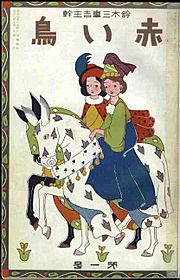Akai tori facts for kids

The first issue of Akai tori
|
|
| Categories | Children's literary magazine |
|---|---|
| Founder | Miekichi Suzuki |
| Founded | 1918 |
| First issue | 1 July 1918 |
| Final issue | 1936 |
| Country | Japan |
| Based in | Tokyo |
| Language | Japanese |
| OCLC | 52282497 |
Akai tori (赤い鳥, meaning Red Bird in English) was a very important Japanese magazine for children. It was published in Tokyo, Japan, from 1918 to 1936. This magazine played a huge role in creating new kinds of stories, poems, and songs just for kids.
Akai tori helped start new ideas in Japanese children's literature. It introduced fresh ways of writing for young readers. These new styles were called dowa (children's fiction) and doyo (children's songs and poetry). The magazine was a leader in movements like doshinshugi (child-centered literature) and jidō bungaku (juvenile literature).
The Legacy of Akai Tori
Akai tori left a lasting mark on Japanese culture. Its influence is still felt today, especially in children's entertainment and education.
Nursery Rhyme Day
The Japan Nursery Rhyme Association recognized the magazine's importance. They named July 1st as Nursery Rhyme Day in Japan. This date is special because it was when the very first issue of Akai tori came out. It celebrates the magazine's contribution to children's songs and poems.
Studied by Scholars
Many experts and scholars have studied Akai tori. They look at how it changed children's literature in Japan. Researchers like Britta Woldering and Elizabeth M. Keith have explored its history and impact. Their work helps us understand why this magazine was so special.

